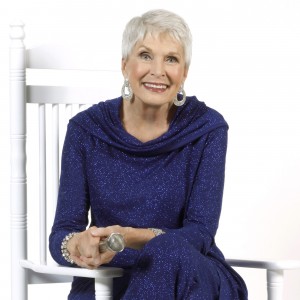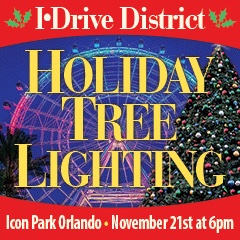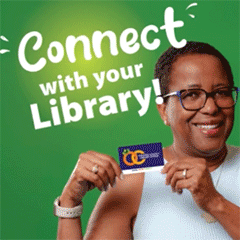Miss Congeniality
Jeanne Robertson’s family-friendly humor makes it way to Orlando next month.
 Dressed in a red blazer, black pencil skirt and stiletto heels, Jeanne Robertson walks across the stage, microphone in hand. She’s telling an uproarious story in her trademark Southern drawl about her husband and an ill-fated trip he made to the supermarket in a video titled “Don’t Send a Man to the Grocery Store.” The comedy clip is just one of many that, when it was posted online, garnered the professional speaker not just a whole new audience, but a second career as a touring humorist who’s selling out theaters all over the United States.
Dressed in a red blazer, black pencil skirt and stiletto heels, Jeanne Robertson walks across the stage, microphone in hand. She’s telling an uproarious story in her trademark Southern drawl about her husband and an ill-fated trip he made to the supermarket in a video titled “Don’t Send a Man to the Grocery Store.” The comedy clip is just one of many that, when it was posted online, garnered the professional speaker not just a whole new audience, but a second career as a touring humorist who’s selling out theaters all over the United States.
But before her comedy stories went viral, Robertson was a pageant winner (she won the title of Miss Congeniality in the Miss America competition in 1964) turned convention speaker who was known to meeting planners for her ability to tell lighthearted stories that could drive home a message. It wasn’t until she was in her 60s that she began to receive attention from the general public and subsequently the media.
“A syndicated show out in Los Angeles did an interview and I was on-site out there and they dubbed me ‘Grandma Gone Viral,’” she says over the phone from North Carolina where she lives. “And they even said to me, ‘Does that hurt your feelings?’ I said, ‘Not in the least.’”
It all snowballed from there with her humorous stories being broadcast on Sirius XM Radio’s family comedy channel and then a Nashville agency approaching her about taking her material on the
road in a national tour.
Now 76 years old, Robertson is still telling her funny stories and winning over crowds with the amiable manner one would expect from a Miss Congeniality titleholder. Robertson, for herself, says she’s just enjoying the ride.
“I’m having a good time,” she says. “I hope you can tell—just having a ball.”
We spoke with Robertson ahead of her The Rocking Humor Tour, which will bring her to The Plaza Live on April 18 for a two-day engagement, and she told us all about being funny, casting friends and family in her stories, and why everyone should look for humor in their own lives.
Why do you call yourself a humorist and not consider yourself a comedian?
The comedian’s main sole purpose is to get most of the audience really laughing. They can do so at anyone’s expense and if you go to a comedy show and you sit in the front, you can expect to be picked on. … [Comedians] can also use any language, any innuendos, go after race, religion, anything that hits them at the time if the majority of the group laughs. In the convention world and the professional speaking world that I was in for so long—and I guess it’s ingrained in me now—if you offended most of the people in the audience … first thing they do when the speech is over is go right to the meeting planner, who could lose his or her job for bringing in the wrong speaker, and they say to that meeting planner, “Did you know she was going to get political? Did you know she was going to get controversial?” … So at a [convention] you could not do that. So I just went with clean humor that would appeal to everybody. …The humorist weaves a longer story and you want to be very, very clever with your words and how you tell the story, but you like everybody happy at the end.
When did you first realize that storytelling and humor were a skill set that you had?
I got a real break. I was a rising junior at Auburn University in Alabama. I lived in North Carolina. … And one weekend I came home and entered the first and only beauty pageant series that I entered. I went to my little hometown and I entered the Miss Graham pageant—Graham, North Carolina; 3,000 people at that time. … I won it. That put me in the Miss North Carolina pageant and it also started me making speeches. At the Miss North Carolina [pageant] there were 84 contestants and I won. That put me in the Miss America pageant. … When I went to that I did not win; I was Miss Congeniality.
… Pageants take a lot of criticism. Some of it is justified but much of it is not. I was 19 years old and I turned 20 that year. When the dust settled, I had made more than 500 little speeches and it took me about a week to figure out early on that if I said something funny, they laughed and they seemed to enjoy it and I did too. So you can’t buy that kind of experience. I crowned the next Miss North Carolina a year later and the following week spoke at three conventions in North Carolina. I just never looked back.
You do a lot of stories that involve your husband and your family members and friends. How do they feel about being the subjects of some of your stories?
Oh, they love it. … Now, I call them my cast of characters and of course I stumbled onto that. … Onstage one day I said, “My husband, Jerry,” and then I stopped and said, “You know, really I call him Jerry sometimes because it’s his name, but really I also call him L.B. for Left Brain.” And the reaction was so great in the crowd. I said, “Because he is left brained. Let me tell you the difference.” And people were pointing at their husbands or their wives because it’s not a male bashing thing. It’s there are left-brained people and there are right-brained people who are both genders, of course. … So he developed into a character. … Then before long I’m telling stories about my best friend. … It’s gotten to the point if I don’t tell a story in a speech about one of [my cast of characters], people come up and say, “Hey, has something happened to Tony? Has something happened to Norma Rose? ”They just look for it. I have friends who say to me, “You can tell a story about me, Jeanne,” and I say, “Well alright, let’s hang around together and maybe I’ll find one.” And they’ll say, “Well, if you have one that somebody doesn’t want told you can just use my name.” My sister told me that, she said, “You could just use my name. I want to be in a story.”
You have a book coming out called Don’t Bungee Jump Naked and Other Important Stuff. Is the writing process for a book different than writing for the stage?
Yeah, absolutely. And I’ll tell you why … in a crowd you can almost do body language and get a laugh or you can make a face and get a laugh, but it is more difficult to put that in writing. …In 2009, I said, “OK, that’s it. I’m stopping this other writing. I’m going to write one story on paper a month and work on it the whole month.” … So I did that once a month and now it’s been 10 years, so I think I’ve improved.
Have you been to Orlando before and what did you think of the city when you visited?
Orlando is a convention city, so at one point Orlando was my busiest city. … I have had ticketed events for the public [in Orlando] because, of course, the public can’t come to conventions. But I have had, I think, three or four [shows] there in the past. But I love Orlando. What’s not to love? Orlando is just a fun city. It’s got a lot of traffic, and you’ve got to know where you’re going and when and all of those things. … I think it’s more diverse than just Disney or just any of the big theme parks, so that’s what makes it fun.
Tell me about The Rocking Humor Tour. What can fans expect from the show in Orlando?
Well, if they have been to several of the shows in Orlando—I keep little records of what I tell when. They should know that they will come back and it would be different material than when I was there before. The reason that it was called The Rocking Humor Tour is that I broke my femur right across my knee. … And so it’s a little more difficult [to stand for long periods of time]. I’m walking around with no problem; I don’t have a cane anymore. I’m doing this, and that, and the other, but we decided that we should name it The Rocking Humor Tour, get a rocking chair and I give away a rocking chair each night. Somebody said, “Wouldn’t it be cheaper, Jeanne, to get one good rocking chair and take it from place to place?” Well, you can’t get a rocking chair in an overhead bin. So we go into town and get a rocking chair and … I sign the back. … But I sit down and do [the show]. A lot of people say it’s more like a fireside chat. … But I’ve had no complaints on it and it’s working, and so we had The Rocking Humor tour and now next year we’re going to rename it Keep on Rocking Tour and then I should be out of it.
You talk a lot about finding humor in everyday life. Why do you think it’s so important that we all look around and find funny things in our own lives?
Because I think it develops an attitude. It becomes a way of life. … I mean I went on a hunt for humor and I realized it affected my whole life. If you go on the hunt for humor and look at the world through humorous eyes, you enjoy where you are and what you’re doing a whole lot more. … I just feel real blessed that I can make people laugh and they have a good time.
This article originally appeared in Orlando Family Magazine’s March 2020 issue.











